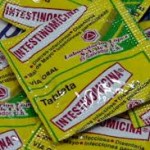 The U.S. Food and Drug Administration is warning consumers that they should not use an over the counter drug product called Intestinomicina. Intestinomicina is marketed as a treatment for infectious diarrhea and acute gastrointestinal infections. If you continue taking this product, diarrhea could be the least of your problems, as it contains an ingredient that can cause serious and potentially deadly problems.
The U.S. Food and Drug Administration is warning consumers that they should not use an over the counter drug product called Intestinomicina. Intestinomicina is marketed as a treatment for infectious diarrhea and acute gastrointestinal infections. If you continue taking this product, diarrhea could be the least of your problems, as it contains an ingredient that can cause serious and potentially deadly problems.
Intestinomicina, which is made in El Salvador, contains a prescription drug ingredient called chloramphenicol. Earlier this year, in July, oral forms of chloramphenicol were taken off the U.S. market due to the risk of serious health problems.
The most dangerous threat associated with oral chloramphenicol is bone marrow toxicity, which occurs when the body does not produce enough red blood cells, white blood cells and/or platelets, the FDA noted in a news release.
While some types of bone marrow toxicity are reversible, in certain rare cases it can lead to death. Those at greatest risk for serious injury or death are patients with anemia, low white or red blood cell count, or decreased blood platelets.
Intestinomicina’s label also lists antibacterial ingredients including neomycin, which is an antibiotic often found in topical medications, and sulfonamides (sulfa drugs). Neomycin and sulfa drugs can cause a variety of reactions, ranging from rashes and hives to severe and life-threatening reactions, the FDA said.
In addition, Intestinomicina may interact with other medications people may be taking, the FDA pointed out in the news release.
Intestinomicina is labeled primarily in Spanish and lists the ingredient as “chloramfenicol palmitato,” or chloramphenicol in English, on the label. It is made by Laboratorios Lopez and is sold in tablet and liquid form by international grocery stores in the United States that feature South and Central American specialty foods and products.
People who bought Intestinomicina should immediately stop taking it and consult with a health care provider, the FDA said in a safety alert issued September 18, 2012.
The FDA also notes that health care professionals and consumers are encouraged to report any adverse events related to Intestinomicina to the agency’s MedWatch Safety Information and Adverse Event Reporting Program.
